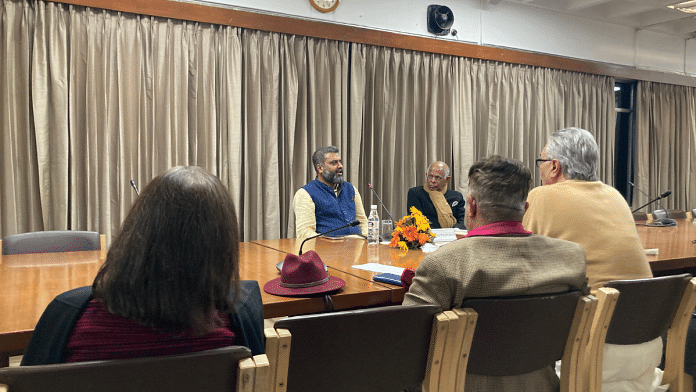New Delhi: As any discussion on India’s strategic policy grows longer, the probability of the dragon entering the room becomes more likely. On 9 February 2024, a talk on India-Maldives relations at the India International Centre eventually became a conversation on China and its role in the island country.
And it was the audience that brought Beijing to the discussion, asking why Maldivian President Mohamed Muizzu and his country are silent on China’s repression of Uyghur Muslims in Xinjiang. They also suggested New Delhi should work with Islamic countries to regain its footing in the Maldives.
The small but engaged audience of about 30 people, which included students, former civil servants, and businesspersons, heard panellist Frank Rausen Pereira, founder of digital knowledge platform Bharata First and consultant anchor with Doordarshan, describe the maritime situation in the Indian Ocean and India’s strategic approach to its relationship with the Maldives.
The conversation began with a discussion on Muizzu’s policies regarding India—specifically on the withdrawal of the 77 Indian military troops posted in the island country. Muizzu, elected on his ‘India Out’ campaign, has looked eastwards to Beijing for support. The chair of the discussion, KP Fabian, former Indian ambassador to Qatar, highlighted that a “formula” could have been offered immediately after Muizzu’s election concerning the presence of Indian troops.
Also read: Bullying Maldives is India’s latest gladiator sport. It’s not how strong nations behave
Is religion the difference?
The discussion delved into the anti-Indian campaigns in the Maldives and questions of religious difference (the island archipelago is dominated by Muslims) before opinions on China and India’s contrasting positions in the Indian Ocean poured in.
“Could the large Islamic population in Maldives be a reason for the anti-Indian sentiment?” one audience member asked, starting murmurs of reflection among the others.
Another commented out loud whether India could “leverage its good relationships with Islamic nations such as the Kingdom of Saudi Arabia or Indonesia to regain its influence in Maldives”. Both Fabian and Pereira agreed that the idea holds merit. “Getting together with a third country – an Islamic country – such as Saudi Arabia or Indonesia or even a country like Sri Lanka to develop joint projects in the Maldives would be a worthwhile step in rebuilding ties,” Pereira said. Adding that India lacked a good track record of completing infrastructure projects in the island country, he also said that such a move could help Delhi’s work in the region.
All in all, the discussion at IIC almost became a scene directly out of 19th century England and Russia: Elites discussing the Great Game where two countries vie for influence in a region.
The two speakers also held strong views on the possibility of Muizzu’s impeachment and India’s position on such an action. “India should not embrace the policy of regime change,” said Fabian.
Talking about why much of the world is silent about China’s actions in Xinjiang, Pereira explained that Beijing’s diplomatic reach has deepened to an extent that it prevents Muslim nations from speaking out. He sees this influence as a result of the ambitious trillion-dollar Belt and Road Initiative (BRI), which envisages new trade routes connecting Beijing with the rest of the world and is touted as the “project of the century”.
Also read: China has changed the equation for India’s neighbours. New Delhi can’t neglect them anymore
The high ‘India Out’ moment
An audience member who lived in the Maldives and worked in the country’s tourism sector pointed out that it would be incorrect to look at the “India Out” politics as a competition between Delhi and Beijing.
“The problem was the issues between former Presidents [Ibrahim] Solih and [Mohamed] Nasheed, who had a falling out with each other. In 2011-2012, India Out was much stronger,” said the audience member.
However, that did not stop the conversation from veering once more into the differences between the Chinese and Indian approaches to Malé.
“India plays it clean when it comes to foreign policy. China, in comparison, ensures they always get what they want from a country,” said Pereira.
In response to a question from ThePrint regarding the heavy investments made in the Maldives by Delhi during the Solih years, and if any leverage exists from it, Fabian said, “Chequebook diplomacy is better than gunboat diplomacy.”
(Edited by Humra Laeeq)




Is it feasible for India and China to share space in South Asia. Not create a binary choice for countries which would like to see more trade and investment with China, without any desire to hurt India’s core interests. Can India develop and deliver Nepal’s hydroelectric potential completely, keeping China out. Whether our foreign policy interests require having a government of choice in the neighbourhood.